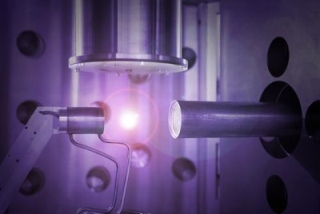Oct 25 2014
Adlyte Inc., a developer of high-brightness extreme light sources for advanced semiconductor inspection and metrology applications, today announced it has reached a key performance benchmark for its extreme ultraviolet (EUV) light source for high-volume manufacturing (HVM)-readiness.
 Adlyte Inc.'s LPP (Laser Produced Plasma) sources produce high-brightness EUV light by focusing a pulsed laser on high frequency droplets of tin.
Adlyte Inc.'s LPP (Laser Produced Plasma) sources produce high-brightness EUV light by focusing a pulsed laser on high frequency droplets of tin.
Adlyte has demonstrated that its EUV light source has maintained clean operation after intermediate focus while running for hundreds of hours replicating multiple parameters for a production environment—including power, brightness and uptime—established by mask inspection original equipment manufacturers (OEMs). Reaching this milestone is the latest example of Adlyte's continuous efforts to productize HVM-ready EUV light sources with advanced debris mitigation and novel irradiation technology.
One of three laser produced plasma (LPP) EUV light-source suppliers in the world, Adlyte is the only one focused on developing light sources for photomask and wafer inspection applications, which are critical for manufacturing future generations of advanced semiconductor devices.
"Mask inspection is a critical part of the EUV lithography infrastructure, and having actinic or 'at wavelength' exposure that meets several key criteria, including cleanliness, is the optimal solution for finding the defects that matter on EUV masks," stated Hidehiro Watanabe, general manager, EUVL Infrastructure Development Center (EIDEC). "We are pleased with the cleanliness we measured on Adlyte's light source under conditions that replicate a production environment. This meets our requirements for blank mask inspection."
"Working with our customers and industry partners, Adlyte is committed to advancing the EUV roadmap and helping to enable the production of defect-free EUV masks," stated Daniel Boehringer, chairman of the board at Adlyte. "We are very encouraged with the latest results we achieved against the cleanliness benchmark established by mask inspection OEM companies. This is testament to the significant investments we've made in developing our light-source technology."
Importance of "clean" EUV light sources
Extremely small nanometer-scale defects on EUV masks and patterned wafers can result in catastrophic yield losses. High-brightness EUV light sources are needed to detect and capture these defects with high throughput and uptime. As with EUV lithography, the clean operation of light sources for EUV mask and wafer inspection/metrology equipment is very important to achieving higher production efficiency and lower cost of ownership.
LPP sources provide a platform that can achieve high brightness and power operation but have historically been challenged in providing the cleanliness needed for HVM applications. Following its previous achievements of meeting the high-source-brightness (250 Watts/mm2 steradian) and power (20 Watts of power into 2 pi) specifications for EUV mask inspection, Adlyte has now demonstrated the required light-source cleanliness needed after the intermediate focus for implementing EUV photomask inspection in HVM.
Adlyte will present these and other EUV light-source technology developments at the 2014 International Workshop on EUV and Soft X-Ray Sources in Dublin, Ireland, November 3-6.